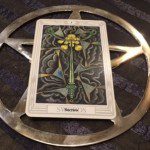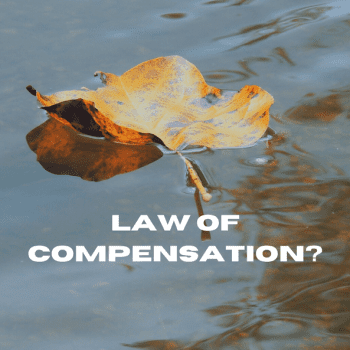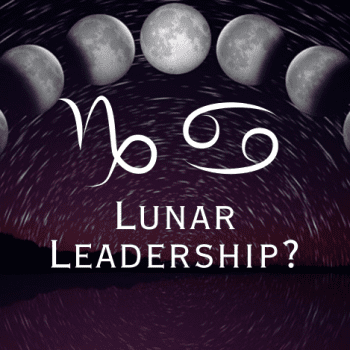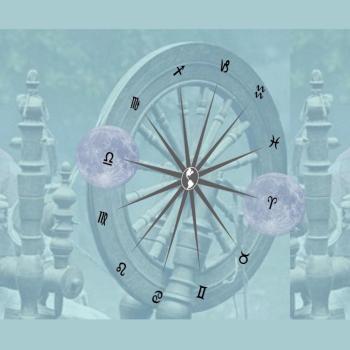In Wiccan rites, in order to enter the sacred circle with other witches, you are challenged at the gates. HOW DO YOU ENTER? The two keys to gain entry were originally, “In Perfect love and Perfect trust.” In recent years, I’ve come to appreciate this concept as one of the most valuable that Wicca has to offer to Witchdom, as a whole. Sadly, I’m finding that it is widely undervalued.
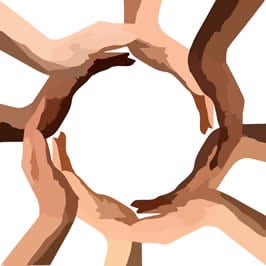
As a new witchling, when I was struggling to understand what was meant by “perfect” and was taught that it meant “unconditional,” my teacher’s answers just brought up more questions within me. I really didn’t understand, and my early attempts to apply this idea in my life opened me up to more than a few broken hearts.
Several leaders whose rituals I attended suggested to me that if I didn’t feel comfortable pledging to love and trust these strangers at an open festival, I could just answer that I entered, “With an open heart and open mind,” instead. I’ve even repeated the same advice to new folks at my own circles over the years. I now believe that this was bad advice based on a crucial misunderstanding.
“Bide the Wiccan laws ye must, in perfect Love and perfect Trust.”(1)
As I taught these basic things, and new students asked the same questions, and raised the same red flags time and again, eventually I stopped avoiding the issue and spent time seeking a better answer. When the books and mentor’s answers failed me, I went directly to the source.
For my Great Work exploration of 2014, I devoted myself to discovering what the goddesses of love had to teach me about unconditional love and trust within a panentheist paradigm, such as I have. It was the hardest year of my witching life, thus far, and when I emerged I had an entirely different pair of “rose-colored glasses” with which to view this seminal piece of wisdom.
With the aid of Aphrodite, I developed what I now call the Thealogy of Perfection, and from there, a way to apply that thealogy practically as the Four Rules of Witchcraft for Personal Sovereignty.

Aphrodite’s Thealogy of Perfection
“Thealogy (a neologism derived from Ancient Greek θεά meaning “Goddess” and λόγος, -logy, meaning “study of”) is generally understood as a discourse that reflects upon the meaning of Goddess (thea) in contrast to God (theo).[1] As such, it is the study and reflection upon the feminine divine from a feminist perspective. Thealogy is distinguished from feminist theology, which is the study of God from a feminist perspective…” Wikpedia
What do we mean by “perfection?”
If the world is a divine tapestry, woven of the love of the Goddess and God, “Love” begins to take on a different definition. If it is EVERYTHING, it is also “Whole” and “Complete” in that there are no parts missing or excluded, and that is healthy thing. Consider the word, “Wholesome.”
Hermetic Alchemy: V. Principle of Rhythm: States: “Everything flows, out and in; everything has its tides; all things rise and fall; the pendulum-swing manifests in everything; the measure of the swing to the right is the measure of the swing to the left; rhythm compensates.” — The Kybalion.
Divine Love would have to be both sides of every polarity, every atom, all states of matter, all types of energy, all phases of the cycle, all types of life-forms, all expressions of gender, all sexual preferences, all social strata, all areas of consciousness, crests and troughs, good hair days and bad hair days, red votes and blue votes, sinners and saints, et cetera and so on. Think of a “Perfect” circle; it is all god/dess.
What is the polar opposite of love?
In order to reveal this mystery to me, Aphrodite dragged me through the thorns of her rose garden. She illustrated for me all the times I feel unloved, by inflicting them upon me. It hurt like hell, but by running this gauntlet, nine Divine love conditions were revealed plain as day. They are listed below. As you read them, think about how you felt during the times in your life that you were denied these things, when some jerk was transgressing your divine love, and how you retaliated to correct the problem.
Aphrodite’s Nine Divine Love Conditions:
When I feel loved, I am in a state of…
- Acceptance as my whole, authentic self without fear of being ostracized.
- Sovereignty with Free Will to pursue happiness as I see fit, and to be treated with dignity and respect.
- Resources to ensure my physical survival in comfort; clean air and water, nourishing food, safe shelter and clothing to protect me from the elements.
- Affection: access to desired nurturing and sexual expression that you prefer.
- Expression: my ideas and opinions have a means of being shared with the respect of being heard and honored as a valuable contributor.
- Security: physical safety, boundaries honored and privacy respected.
- Authenticity: the outward declaration of any circumstance is the actual truth, without deception, or exploitation.
- Trustworthiness: I can rest assured that those around me, and my environment, can be trusted to not hurt me.
- Reciprocity: Those people around me return the same level of respect and consideration to me, and are equally worthy of my trust.
So, if the above conditions are how Divine love are felt here on Earth, then what lies on the other side of this polarity? If Love is everything, then the opposite is nothing…the opposite of Love is the Void of Love. I think that the first thing that emerges from that void is Fear — Fear of a lack of love.
Perfect love, is the “whole,” Divine love that acknowledges you as a sovereign being, with dignity and worth, having ALL parts; light and shadow. The opposite of Love grows from the fear of a LACK OF LOVE felt when we are denied acceptance, sovereignty, resources, affection, authenticity and reciprocity.
When we do not have these things we are wounded, deep down in our souls. To be denied these basic human needs for too long creates imbalance, stress, and trauma, and from that grows anxiety, fearfulness, and anger, that twists and festers inside us and emerges at paranoia, hatred, and insanity.
Fear of a lack of love leads to bigotry and hostility wherein we lash out and impose the same transgressions that we’ve suffered onto others as a way of either getting what we need the hard way, or exacting revenge. We become the bully, and do harmful things, like a giant billboard announcing what thorn wounded us in the first place. “Thou dost protest too much!” This is the shadow, and we project our own fearful shadow onto those around us, calling out those things we hate most about ourselves.
In You Can Lead a Witch to Circle, but You Can’t Make Them Coven–I wrote:
Perfect, or unconditional, Divine love doesn’t mean unconditional relationships. It means I acknowledge your sovereign right to pursue happiness as you see fit, and I treat you with equal dignity all incarnate spirits deserve, even when you are acting like a loathsome jerk. Perfect, or unconditional, trust means that I will be a trustworthy person toward you, even when I see you breaking that trust. Neither, of these things means I am obligated to be your friend. What it does mean, is that I will not become your enemy.
Perfect Trust
Perfect Love is a powder keg unless it is tempered by the most important part of that statement about “Perfect Trust.” This sets the strong boundaries in place that make a safe environment for all that unconditional love you’ll be offering. To pledge that you enter with perfect trust is a statement that YOU are trustworthy, and that should be easy enough to promise to anyone at anytime, but most of all to the witches that join you on sacred ground.
Trust is the social contract between members that promises that the care that you are extending to them will be returned in equal measure, to the best of their ability. This is the trust that they are honest and authentic in their dealings with you, and that they will not transgress against your boundaries, while expecting the same from you in return, to the best of your ability. This is about reciprocity. This is the “Golden Rule,” in witchcraft terms.

This social contract is a two way street and promises that you are both trying to live up to your shared ideals. If one of you misses the mark, then you will respectfully work together to resolve the dispute, and vice versa, without a witchwar or sending hate-mail, waging a smear campaign all over social media, nor cursing them into a toad.
If it becomes clear that you do not share the same ideals; if someone DOES do those trust-breaking things, cannot understand the harm that causes you, will not apologize, work to make amends, or adapt their behavior, then you have some very hard choices to make. In my opinion, if they break the contract, you peacefully sever all ties, and remove their access to harm you further. You have no control over other people, but you do have absolute control over your own affiliations. Namaste Away!
Why would you pour your energy into people who repeatedly prove to be untrustworthy? Why would you step into a magickal circle, into an energy amplifier, and call in the Powers alongside such a person? To do otherwise enables their wrong-doing at least, and at worst destroys yourself and all that the circle is attempting to build.
Which leads to the question of what ideals you supposedly share.
Continue on to read my pithy, yet hopefully thought-provoking and memorable ways to think about this question, that I call “Heron’s Four Rules of Witchcraft for Personal Sovereignty.”
Blessings,
~Heron
- In 1974, twenty-six line poem entitled “The Wiccan Rede” was published in the neo-Pagan magazine Earth Religion News. (back)


